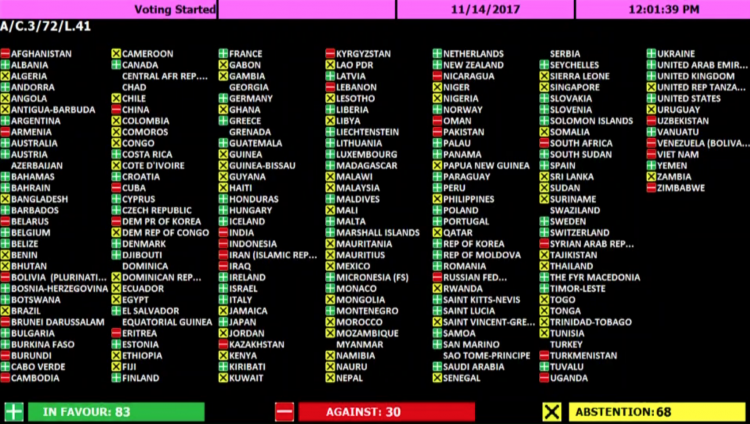Tabriz,South Azerbaijan,Nov 15
In an overwhelming sign of international support for human rights in Iran, 83 countries approved a resolution by the UN Third Committee today criticizing the state of human rights in the Islamic Republic.
The resolution by the UN’s Third Committee on Social, Humanitarian and Cultural Affairs, while noting progress in some areas, voiced “serious concern” over many areas of human rights violations in the country.
“The international community has spoken: Iran must improve its human rights record,” said Hadi Ghaemi, executive director of the Center for Human Rights in Iran (CHRI).
Canada, which sponsored the resolution, consulted with dozens of countries and many human rights organizations in order to gather information in an inclusive manner, and allowed extensive input and dialogue among member states on the resolution.
The resolution welcomed progress in the areas of death penalty legislation and Iran’s participation in the Committee on the Rights of the Child, the Committee on the Rights of Persons with Disabilities, and in the Universal Periodic Review (UPR). It also noted Iran’s peaceful electoral process and welcomed Iran’s contact with the UN Special Rapporteur on the situation of human rights in Iran.
However, the resolution expressed “serious concern” at the “alarmingly high frequency” of the imposition of the death penalty,” including against minors and on the basis of “forced confessions.”
It urged the Islamic Republic to “cease the widespread and systematic use of arbitrary detention, including the use of such practices to target dual and foreign nationals, and to uphold, in law and in practice, procedural guarantees to ensure fair trial standards, including timely access to legal representation of one’s choice from the time of arrest through all stages of trial and all appeals.” It noted the need to address the poor conditions of Iran’s prisons, specifically citing the denial of access to adequate medical treatment. It also asked Iran to end the house arrest of leading opposition figures from the 2009 presidential elections.

Eighty three countries voted in favor of a UN human rights resolution (A/C.3/72/L.41) on Iran that was passed on November 14, 2017, by the UN Third Committee. Thirty member states voted against the resolution and 68 abstained.
The resolution urged Iran to respect the right to freedom of expression, opinion, association and peaceful assembly, both online and offline, “including by ending the harassment, intimidation and persecution of political opponents, human rights defenders, women’s and minority rights activists, labor leaders, students’ rights activists, academics, film-makers, journalists, bloggers, social media users and social media page administrators, media workers, religious leaders, artists, [and] lawyers,” and for Iran to allow “a safe and enabling environment in which an independent, diverse and pluralistic civil society can operate free from hindrance and insecurity.”
The committee called on Iran to eliminate, in law and in practice, all forms of discrimination against women and girls and against persons belonging to religious, ethnic, linguistic or other minorities.
The resolution called upon Iran to deepen its engagement with international human rights mechanisms by cooperating with the special rapporteurs and special mechanisms, including approving requests for access to the country by mandate holders. Iran has refused to allow any UN mechanism, including the special or thematic rapporteurs, to visit the country. Iran claims that it has allowed six UN mandate holders to visit Iran since 2003, yet no mandate holder since 2005 has been allowed to visit the country.
CHRI urges the authorities in Iran to heed all of the recommendations of the Third Committee resolution and to begin working closely with the UN, including its special rapporteurs and mechanisms, to implement substantive improvements in the areas of concern noted in the resolution.
During the committee session, Iran’s representative did not respond directly to any of the issues raised in the resolution by the committee. Instead the Iranian representative launched a verbal attack against Canada for sponsoring the resolution, and criticized the resolution as a politicized document, indicating that Iran may still not be ready to extend its cooperation to the UN mechanisms.
Sixty-eight member states voted to abstain. At the session, abstaining countries such as Brazil and Chile raised their concerns regarding multiple rights issues such as executions in Iran or discrimination against religious and ethnic minorities, explaining that their vote was meant to encourage Iran to cooperate with the UN and its special mechanisms.
Thirty countries voted against the resolution. In voting against the resolution, Iran was joined by political allies such as China, North Korea, Pakistan, Russia, Syria and Venezuela. These countries rejected the use of country-specific UN mechanisms to address human rights issues.
Source: Iran Human Rights

